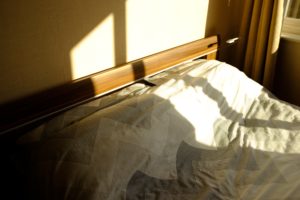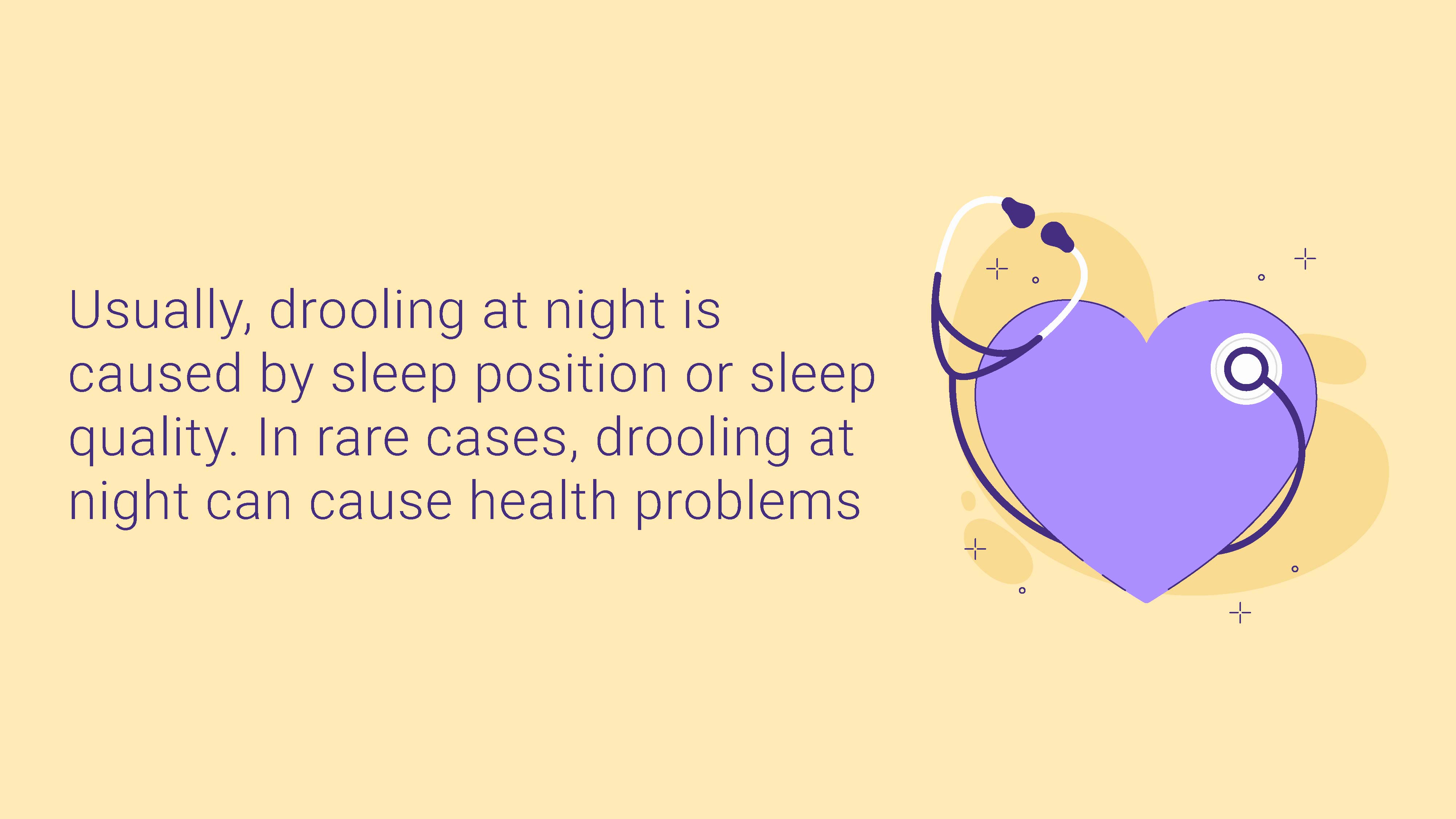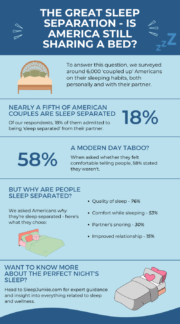Why Do People Drool When They Sleep?
Everyone has woken up after a good night of sleep with an open mouth and a puddle of drool on their pillow. It’s sticky, unpleasant, and not very attractive.
When nighttime drooling happens every once in a while, you might be a little embarrassed. But if you begin to wake with a wet pillow every morning, you might begin to wonder what’s going on.
Let’s talk about what causes drooling when you sleep and what you can do about it. If you’re a night drooler, there’s good news. Usually drooling is a side effect of a treatable underlying condition.
What Causes Drooling?

The saliva in your mouth is an important component of your digestive system. Production of saliva takes places in your salivary glands, and the mucus in saliva helps moisten your food so you can swallow it. Saliva also contains enzymes to break down the food you eat and begin digestion. It’s an essential component in the digestive process— you couldn’t eat without it!
As you sleep, your body produces saliva. At the same time, your body is in a state of relaxation, meaning your muscles are loose and relaxed. The muscles in your face and jaw holding your top and bottom teeth together are also relaxed.
When you’re getting a good night’s sleep, you might be in a certain sleeping position causing your relaxed jaw muscles to form an open mouth. Combine an open mouth with saliva production and you’ll find yourself waking up in a pool of drool.
Sialorrhea and hypersalivation are the medical terms for excess drooling. These terms are interchangeable. Sialorrhea and hypersalivation are usually caused by an underlying disorder.
Gastroesophageal Reflux Disease (GERD)
Excessive saliva due to GERD is called waterbrash. GERD causes stomach acid to rise up from your stomach into your throat. When stomach acid enters the back of the throat or the mouth, your body’s natural reaction is to produce saliva. The contents of your saliva can neutralize the acid. Treating GERD will prevent excessive drooling.
Sleep Apnea
Drooling at night can be a sign of sleep apnea. This sleep disorder causes drooling by obstructing the airway, making it easier to breathe through the mouth. When an individual has sleep apnea, their breathing movements are abnormal. Sleeping with an open mouth and abnormal breathing movements lead to excess saliva production and drool.
Sleep apnea is a serious medical condition requiring treatment. If you suffer from sleep apnea, you are not breathing at night is not consistent; meaning, your brain is not getting the ongoing oxygen it needs to stay healthy.
It’s very important to follow up on any signs of sleep apnea. If you think you might suffer from sleep apnea, see your primary care provider or an ear, nose, and throat (ENT) specialist. Most people with sleep apnea are able to manage their condition. A treatment called continuous positive airway pressure (CPAP) can be prescribed by a sleep specialist.
Certain Medications
Some medications, such as psychiatric prescriptions, can cause the body to produce excess saliva. Drooling can also be caused by medications for conditions like Alzheimer’s disease and myasthenia gravis.
Pregnancy
It’s a little talked about fact, but pregnancy increases saliva production. In fact, some women say drooling was the first sign of early pregnancy. It’s not harmful to a woman or a fetus, but can be annoying and uncomfortable for many women.
During pregnancy, your blood volume increases in order to provide nutrients to the growing fetus. As a result, the body’s saliva production also increases. Many pregnant women find mints and hard candies can resolve some of the discomforts of excess saliva. Lip moisturizer can prevent chapped lips and mouth sores caused by saliva.
Difficulty Swallowing
Dysphagia is the term used to describe difficulty with swallowing or the inability to swallow. The inability to swallow means saliva will pool in the mouth and lead to drooling. Dysphagia can be caused by some nervous system disorders. These disorders include Bell’s palsy, amyotrophic lateral sclerosis (ALS), and Parkinson’s disease. These disorders affect swallowing because the jaw muscles are weakened and unable to close the mouth.
Dysphagia can also be caused by a stroke. During a stroke, oxygen doesn’t flow adequately to the brain. When this happens, the neurons that control muscle movement can be damaged. This makes it difficult to control the muscle action of the jaw.
Dysphagia is a dangerous condition because it puts a person at risk for choking. A person with dysphagia needs help eating, drinking, and managing their saliva. All liquids should be thickened because they put a person at the greatest risk for choking.
Is Drooling at Night Dangerous?
Usually, drooling at night is caused by sleep position or sleep quality. In very rare cases, drooling at night can cause some discomfort or health problems.
Sleeping with an open mouth causes dehydration and dry mouth. The lips and skin around the mouth can become chapped from the irritation of the saliva, and sores might form in the corners of the mouth.
Dryness from mouth breathing can also cause a sore throat. In very rare cases involving excessive drooling, saliva can pool in the throat and lead to infection. Keeping the lips and mouth moist throughout the night can prevent some of these uncomfortable side effects.

How to Stop Drooling at Night
When a medical condition isn’t the reason for nighttime drooling, you can change some habits to decrease nighttime drooling.
1. Change Your Sleep Position
Most people sleep on their stomach or side, but sleeping on your back can improve your drooling. Adopting a new sleep position can be uncomfortable for the first few nights, but after a week or so, it will begin to feel natural. In addition to limiting drooling, back sleeping can reduce your risk of experiencing aches and pains upon waking up in the morning.
2. Stay Hydrated
When you are dehydrated, your body produces excess saliva to moisturize your mouth.
Remind yourself to drink water throughout the day by setting an alarm. Or, carry a large water bottle with you and drink it throughout the day. A good rule of thumb is to aim to drink 64 ounces of water each day. Eat lots of fresh fruits and vegetables whenever possible. Fresh produce is a great source of water and nutrients.
3. Treat Allergies and Infections
Saliva helps keep your body healthy by flushing out bacteria, viruses, and allergens. When your immune system is compromised, saliva production increases to get rid of foreign invaders.
Allergens
When paired with itchy eyes and sneezing, drooling might be related to seasonal allergies. Many people experience side effects of allergens from dust, mold, and pollen. If you think you might have allergies, visit a healthcare provider and talk about treatment options. Once your allergies are treated, you are likely to get much better sleep. Many people are able to treat their allergies using over-the-counter medications.
Nasal and Sinus Infections
Your nasal passages and sinuses are like a superhighway of connected tunnels keeping your breath flowing freely. When your sinuses get congested from a cold, flu, or other infection, lymph fluid can build up and create a blockage. When you are unable to breathe through the nose, mouth-breathing is the result; this type of mouth breathing causes drooling from excess saliva.
Sore Throat
When you have a sore throat, you have pain with swallowing. Most people try to avoid swallowing with a sore throat, leading to a build-up of saliva in the mouth. The excess saliva will result in nighttime drooling. Treating the sore throat and its underlying causes will prevent continued drooling. Keep a throat spray or moisturizer by the bed to use when you are woken by throat discomfort.
4. Wear a Mandibular Device
A mandibular device, also called an oral appliance, is similar to a mouthguard and helps your jaw rest more comfortably at night, preventing hypersalivation. Talk to your dentist or sleep specialist about acquiring one.
So, Why Do I Drool When I Sleep?
Drooling at night usually isn’t harmful, but it can be annoying and embarrassing. It can also be a sign of something more serious like a chronic health condition or pregnancy.
Excess salivation can also be a result of neurological conditions and some sleep disorders. Changing your sleep position and treating allergies can prevent hypersalivation at night. If you prefer an aggressive approach, you can wear a mandibular device or talk to your doctor about other possible solutions. Usually, there is an underlying cause of drooling that can be treated.


